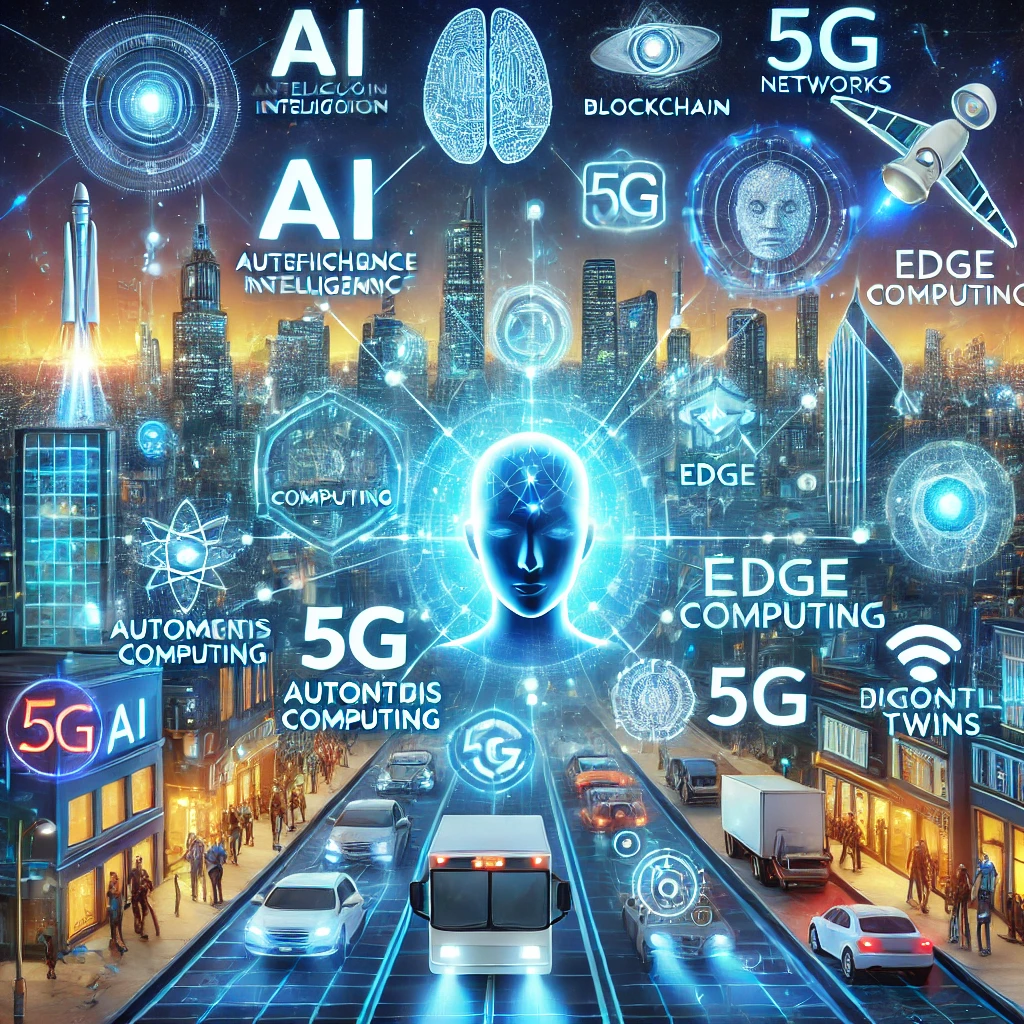
20+ Top Technology Trends for 2024: Future Tech Insights
20+ Top Technology Trends for 2024: Future Tech Insights
Current Technology Trends and Predictions
In today’s rapidly evolving digital environment, staying informed about the top technology trends in 2024 is essential for businesses individuals alike. The tech landscape is a whirlwind of innovation, where advancements in artificial intelligence (AI), machine learning (ML), blockchain, and the Internet of Things (IoT) are fundamentally reshaping how we live and work. According to the RSM US MMBI special report, digital transformation is no longer just a buzzword; it has become a strategic necessity for organizations seeking to maintain a competitive edge.
As technology continues to evolve, global IT spending is projected to increase by 8% from 2023 to 2024, reaching approximately $5 trillion. With this substantial investment, the adoption of emerging technologies is set to redefine industry standards and operational methodologies.
Top Technology Trends in 2024

1. Generative AI
Generative AI is leading the charge in technology trends for 2024, creating new content from existing data in fields like natural language processing, art, and healthcare. By enabling human-like text generation and original artworks, generative AI is poised to transform industries and improve efficiency across various applications.
2. Robotic Process Automation (RPA)
RPA is becoming essential for automating repetitive tasks, significantly reducing manual effort and enhancing operational efficiency. This technology allows organizations to focus on higher-value activities, thereby improving productivity and reducing costs.
3. Data Science and Big Data Analytics
Harnessing vast amounts of data, data science and big data analytics empower businesses to make data-driven decisions. By leveraging advanced tools like AI and ML, organizations can extract valuable insights, boosting efficiency and driving innovation.
4. Digital Twin Technology
Digital Twin Technology creates virtual replicas of physical objects and processes, facilitating predictive maintenance and real-time monitoring. This technology is driving innovation across various sectors, optimizing performance and decision-making.
5. Quantum Computing
Quantum computing promises unparalleled computational power, enabling the solution of complex problems at extraordinary speeds. Its applications in fields such as drug discovery and cryptography are set to revolutionize industries.
6. Artificial Intelligence and Machine Learning
AI and ML continue to reshape industries, driving automation and enhancing decision-making capabilities. Their rapid advancements are creating intelligent systems that redefine business operations and improve daily life.
7. Edge Computing
By decentralizing computing closer to data sources, edge computing reduces latency and enhances data security. This technology is critical for real-time processing applications, such as autonomous vehicles and smart cities.
8. 5G Technology
5G is transforming connectivity, offering remarkable speeds and reduced latency. Its deployment across industries is unlocking new possibilities, revolutionizing how we interact with technology.
9. Blockchain Technology
Beyond cryptocurrencies, blockchain is finding applications in various sectors, ensuring data integrity and trust. Ongoing advancements promise to drive innovations in digital identity and decentralized finance.
10. AI in Cybersecurity
The integration of AI in cybersecurity enhances threat detection and establishes robust defenses against digital threats. This trend is essential for safeguarding data and systems in a rapidly evolving threat landscape.
11. AR/VR
Augmented Reality (AR) and Virtual Reality (VR) technologies are at the forefront of immersive experiences. They are revolutionizing sectors such as gaming, education, and retail by enhancing user interactions.
12. Internet of Things (IoT)
IoT is interconnecting devices and systems, streamlining operations, and improving efficiency across multiple domains. This technology facilitates the creation of smart homes, cities, and industrial applications.
13. Cloud Computing
Cloud computing is evolving, with a shift towards serverless computing. This trend simplifies development processes and enhances scalability, allowing organizations to focus on code rather than infrastructure management.
14. Natural Language Processing (NLP)
NLP is revolutionizing human-computer interactions, powering chatbots and voice recognition systems. Its advancements are enhancing language comprehension and opening new applications across industries.
15. Metaverse
The metaverse merges virtual and physical realities, creating immersive environments for socializing, working, and playing. As major tech companies invest in this space, it promises to reshape digital interaction.
16. Biometric Technology
Biometric technology is transforming security measures through secure and convenient authentication methods like facial recognition and fingerprint scanning. Its integration is enhancing security across various sectors.
17. Human Augmentation
Human augmentation enhances capabilities through advanced technologies, from prosthetics to brain-computer interfaces. This trend has profound implications for healthcare and our understanding of human potential.
18. DevOps and Continuous Integration/Continuous Deployment (CI/CD)
DevOps and CI/CD methodologies are reshaping software development, fostering collaboration and automation throughout the development lifecycle. This trend enables faster and more reliable software releases.
19. Autonomous Vehicles
Autonomous vehicles utilize advanced technologies to navigate without human intervention, promising enhanced safety and efficiency in transportation. As this technology matures, it could revolutionize mobility.
20. Smart Cities Technology
Smart Cities Technology integrates IoT, AI, and data analytics to optimize urban living. It aims to create sustainable, efficient environments that enhance citizens’ quality of life.
21. Genomics
Genomics explores DNA and its role in health, offering insights into diseases and potential treatments. This field is rapidly advancing, with roles spanning technical and research-focused positions.
Benefits of Investing in Top Technology Trends 2024
Investing in these emerging technologies offers numerous advantages, including:
- Enhanced Efficiency: Improved features lead to increased productivity and streamlined processes.
- Competitive Advantage: Staying updated with technology trends helps businesses offer innovative products.
- Cost Savings: Modern technology reduces manual efforts and optimizes resources, leading to long-term savings.
- Improved Communication: Advanced tools foster better collaboration among teams and clients.
- Market Relevance: Embracing tech trends demonstrates a commitment to innovation, attracting tech-savvy customers.
- Data Security: Updated technologies enhance security features, protecting sensitive information.
- Customer Satisfaction: Technologically advanced solutions improve user experiences, increasing loyalty.
Bottom Line
The relentless evolution of technology is reshaping our digital future. Embracing the top technology trends in 2024 is essential for those seeking to stay ahead in a competitive landscape. From the transformative potential of AI to the interconnected promise of the Internet of Things, these trends are not just glimpses into the future—they are the building blocks of a revolutionary era today. As we navigate this dynamic landscape, staying informed and adaptable is vital for leveraging technology as a seamless extension of our boundless human potential.
FAQs on Top Technology Trends
Q: What is a technological trend?
A: A technological trend refers to the prevailing direction in which new and innovative technologies are developing and being adopted.
Q: Which technology is best in 2030?
A: Predicting the best technology in 2030 is speculative, but many experts anticipate that AI, quantum computing, and advanced biotechnology will be among the most impactful.
Q: What is the next booming technology?
A: The next booming technology is likely to be AI and generative AI, particularly advancements in machine learning and neural networks.
Q: Which technology is best for the future?
A: The best technology for the future is subjective, but AI, renewable energy technologies, and biotechnology are often highlighted for their potential impact.
Q: What are the top 10 emerging technologies?
- Artificial Intelligence and Machine Learning
- Quantum Computing
- 5G and Next-Generation Connectivity
- Blockchain Technology
- Augmented Reality (AR) and Virtual Reality (VR)
- Internet of Things (IoT)
- Advanced Robotics and Automation
- Biotechnology and Gene Editing
- Renewable Energy Technologies
- Cybersecurity Innovations
Q: What is the fastest-growing technology?
A: Generative AI and AI are currently the fastest-growing technologies, driven by widespread adoption and continuous advancements.
Why You Need to Read These Blog
20+ Top Technology Trends for 2024: Future Tech Insights
17 Coolest Tech Gadgets You Must Check Out
Navigating Digital Marketing Consultant Hourly Rates
The Complete Guide to Level 1 vs. Level 2 vs. Level 3 Charging for EVs
Born in the USA – 5 American Innovations that Changed the World
What is an AI Idea Generator and How It Can Help Your Business?
Zhuoxin Data Technology: Transforming Data Solutions for the Future
Top Authors That Have a Simplicity Writing Style
Best Free AI for TikTok Content Ideas
What If You Ordered the Toktoq Set Before 5/17?






